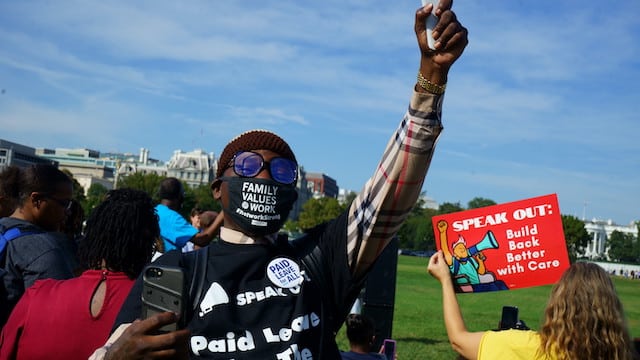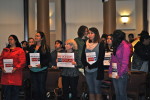Earning Paid Sick Days Promotes Equity

 Communities need paid sick days to keep people healthy, to help workers stay employed, to boost the economy. But as a Halloween rally in Portland demonstrated, being able to earn paid said days is also an issue of equity.
Communities need paid sick days to keep people healthy, to help workers stay employed, to boost the economy. But as a Halloween rally in Portland demonstrated, being able to earn paid said days is also an issue of equity.
Nearly 60 Latino workers and family members came to City Hall to support a measure that will ensure Portlanders can earn paid sick days. The rally was organized by Causa Oregon and Vecinos en Alerta.
As Francisco Lopez, Executive Director of Causa Oregon, put it, “At a time when families’ finances are stretched and unemployment is high, no worker should lose critical income or risk being fired when they take time off to recover or care for a sick loved one.”
A new fact sheet from The Everybody Benefits – Portland’s Campaign for Earned Sick Days coalition lays out the disparities in the Portland area.
- Workers of color:In the Portland metro area, nearly 6 of every 10 Latino workers – 57% – don’t earn a single paid sick day. The numbers are also higher for African-American workers – 42% – compared to 39% of white workers, itself a shameful reality.
- Low-wage workers: This group is much less likely than higher-wage workers to have access to paid sick days, and less likely to be able to afford to stay home unpaid when sick. Nationally, a shocking 80% of our lowest wage earners (those in the bottom 10%) earn no paid sick days, compared to more than 84% of people in the top 25% of earners have paid sick leave.
- Single mothers: In Multnomah County, 48% of single mothers of color and 32% of white single mother are living in poverty. Without a second income to rely on, these caregivers are less able to forego a day’s pay when they get sick. They also are less able to rely on another parent to stay home and care for a sick child, forcing an impossible choice between economic security and responsible parenting in times of illness.
 One woman shared a typical family’s situation with commissioners. Her husband has worked for the same employer for 15 years yet has never been allowed to earn a paid sick day to care for his own or his family’s health. She described the significant financial challenges that this creates for her family – and his fear of losing his job over just a cold or flu.
One woman shared a typical family’s situation with commissioners. Her husband has worked for the same employer for 15 years yet has never been allowed to earn a paid sick day to care for his own or his family’s health. She described the significant financial challenges that this creates for her family – and his fear of losing his job over just a cold or flu.
Members of other racial justice groups – Center for Intercultural Organizing, the Urban League, and Asian Pacific American Network of Oregon – expressed their support for an earned sick days measure. Leaders called on Portland’s city commissioners to take this small step with big results toward a more equitable and healthy local economy, by solving this community problem now.